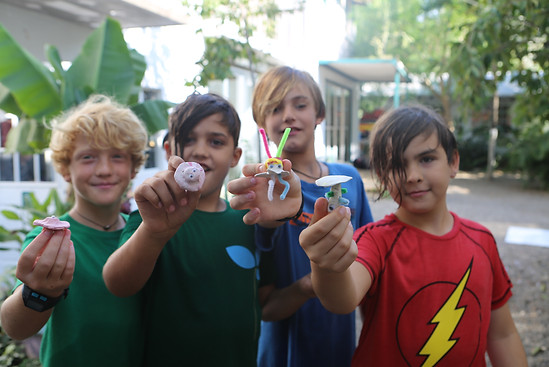Why Children?

"Our parents do not leave us the world,
it is lent to us by our children."
-African proverb
CHILDREN AS THE FUTURE
It is not that environmental education is important for citizens of all ages, however, focusing on children provides unique advantages. In general, it is believed that children are important agents of social change in society. Children, of course, represent the future of our civilization. They will grow and will become the citizens and consumers whose attitudes and perspectives will
lead to decisions that will affect the environment. Within this, it is an opportunity for environmental education to boost the development of a generation that seeks not to harm the environment, but that aspires to treat the environment and its resources with respect.
AN EFFECTIVE APPROACH
There have been many studies that have shown that environmental education is more effective when it focuses on children. A 2006 study by researchers in the United States found that children's interactions with "wild" nature before the age of eleven were more likely to provoke behaviors and attitudes in adulthood that benefited the environment. Similarly, German researchers found in their 2012 study that younger students, between ten and eleven years of age, were significantly more receptive to environmental education compared to their older counterparts.
BENEFITS FOR CHILDREN
In addition to the great effectiveness of environmental education with children, there are other benefits for children, mainly healthy development that stimulates interactions with the natural world. Children become healthier, wiser and more content when they are more connected during their childhood with the natural environment. These benefits are lasting and significant and will have a positive impact on their future well-being, as well as on the contributions they will make to society as adults. Studies have shown that the average American spends more than 90% of his time indoors. For children, this leads to the development of unfounded fears and feelings of aversion towards natural objects. This results in the risk that children never develop positive attitudes and feelings towards the natural environment. In trying to solve the growing environmental problems facing our society, these feelings of apathy lead to inaction and greater exploitation and environmental degradation.
A SENSE OF WONDER
Environmental education and time spent in the natural environment have a direct correlation with the development of positive feelings towards nature. For children in contact, the natural world is a source of wonder, joy and awe. The experiences with nature nourish this connection and provide the basis for a future rooted in the appreciation of the environment and dedicated to its prosperity. Rachel Carson, biologist and leader of the environmental movement in the 1960s, expressed the importance of environmental education and its power to inspire children in her book "The meaning of wonder". Carson affirms that "if a child must keep alive his innate sense of wonder, he needs the company of at least one adult who can share it, rediscovering with him the joy, emotion and mystery of the world in which we live". Education rooted in practical experiences in the natural world has the potential to provide students with the important connection to the natural world, nurturing their sense of wonder and developing an ethic of caring for the environment. Saltwater Classroom is dedicated to this practical experience with nature. Through field trips and conservation missions, participants have the opportunity to interact with the marine environment and form connections with the sea. Whether it's a tidal expedition focused on field science or beach cleanup, these interactions will expose students to the ocean and lay the foundation for a strong connection to it.
BEYOND THE CHILDREN THEMSELVES
Environmental education promotes healthy development and nurtures a child's sense of wonder, but the impact of environmental education with children does not stop there. Rather, the impacts extend beyond the children themselves, affecting other members of society. Children are not only agents of change who are more concerned, informed and competent, but also have the potential to generate change by influencing peers, family members and the community in general. Research studies have demonstrated the significant power of children to shape the values of their parents and exercise strong influence from the peer group. Educational strategies focused on children, therefore, have a broader impact and added value through the production of a domino effect, changing the knowledge, attitudes and behaviors of various adults around them.
CREATING A CONSCIENTIOUS FUTURE
Environmental education aimed at providing individuals with the tools to explore environmental problems, participate in solving problems and take positive measures to improve the environment has the power of significantly affect our environmental condition by changing the lives of children, the face of the future.
